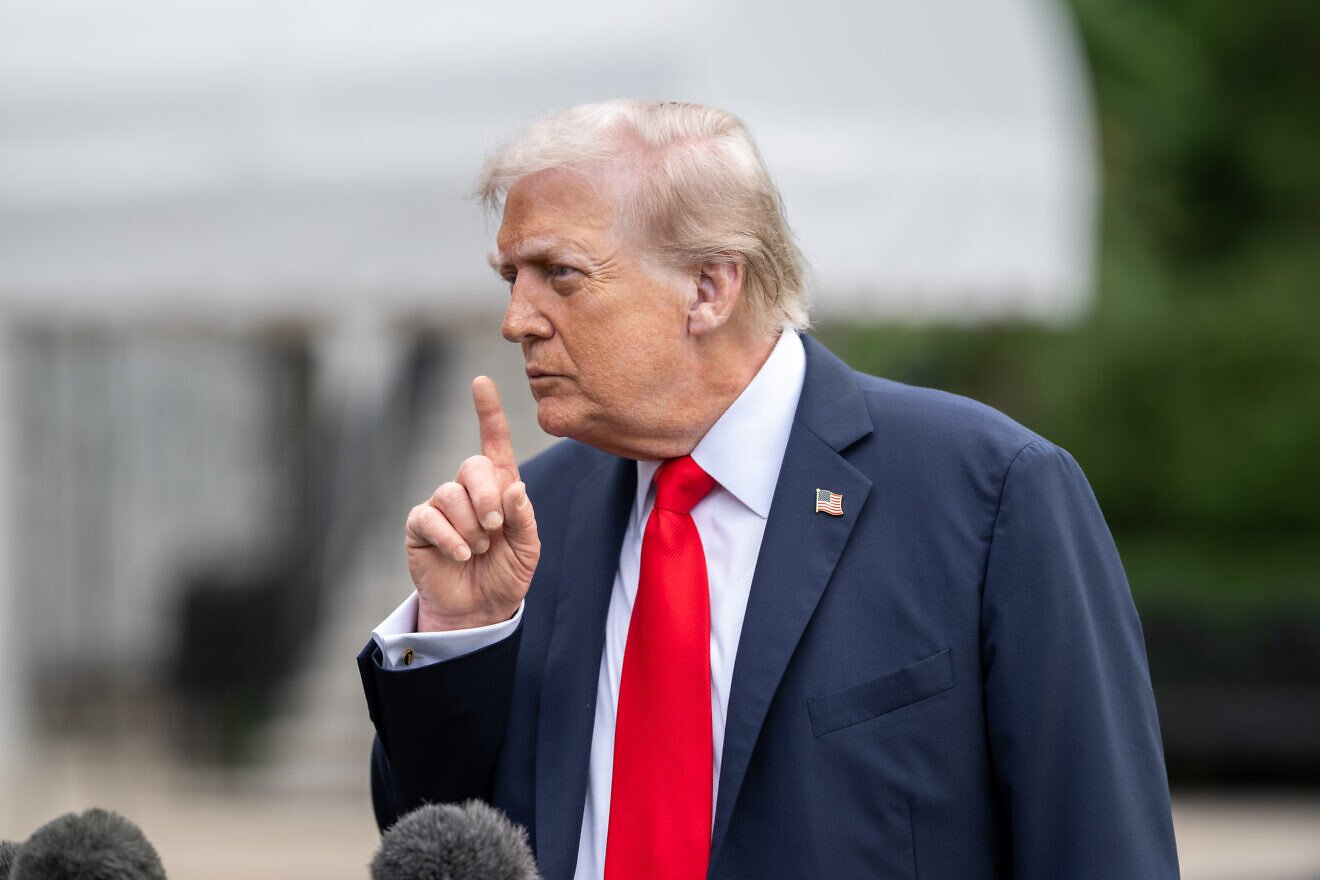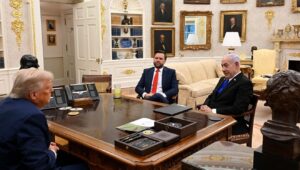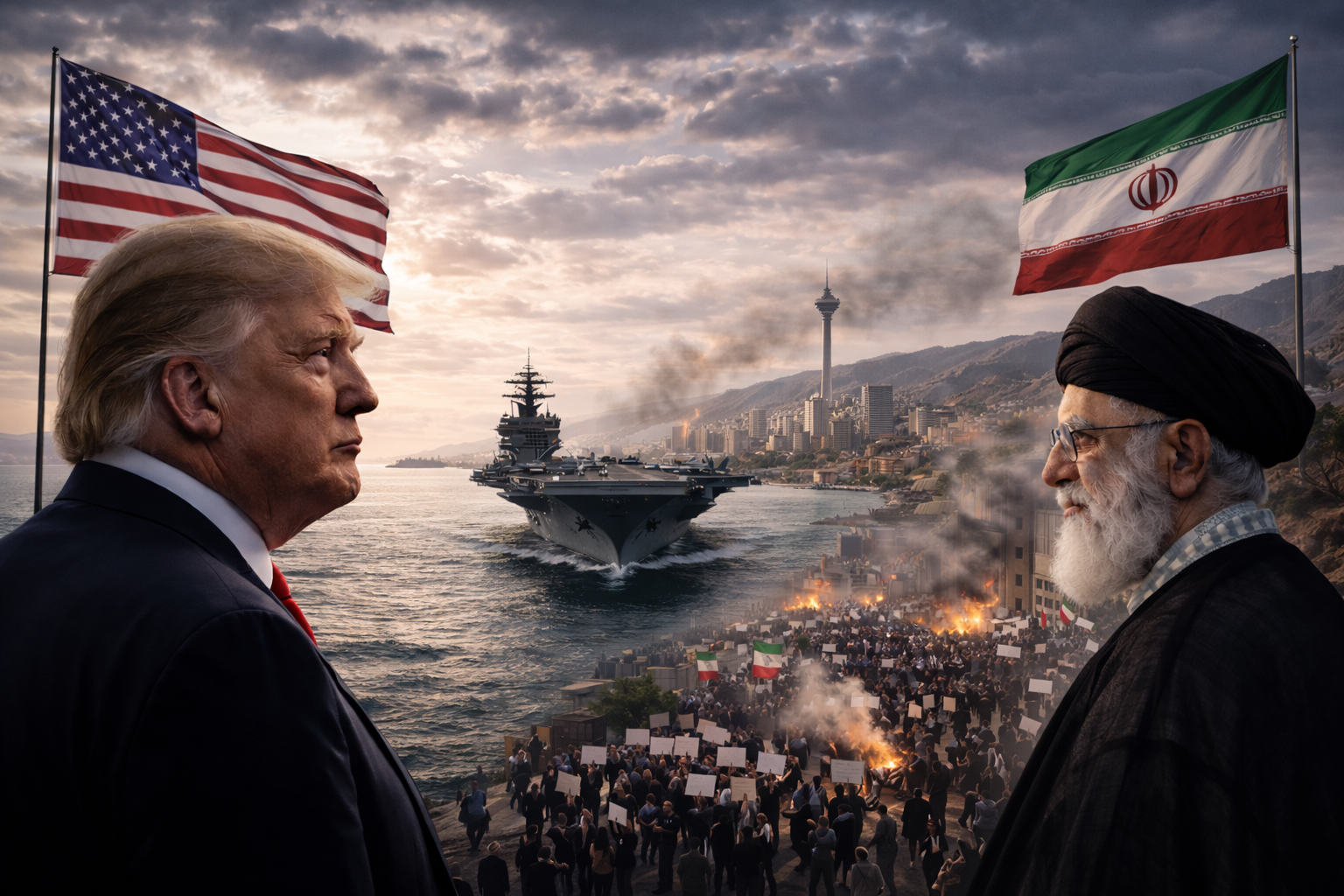(JNS) The New York Times noted with dismay that there was a big difference between reactions to President Donald Trump’s speech to the UN General Assembly this week and the way his appearances at the world body were received during his first term. In 2018, Trump was openly laughed at by the representatives of other nations. They regarded him as illegitimate and a buffoon, someone they didn’t have to take seriously.
And as much as the global bureaucracy still regards him, his ideas and his supporters with contempt, they’re not laughing anymore.
Instead, they’re politely applauding his rants from the GA podium the way they do for other leaders and then lining up to ask for meetings with the president to beg for favors.
In some ways, that’s all to the good.
At least for now, it means that the United States isn’t, as it was under the Biden and Obama administrations, automatically funding every malign, anti-American, antisemitic institution and initiative coming out of the world body and its agencies.
Nobel ambition
But the new deference he’s receiving is also fueling Trump’s foolish craving for a Nobel Peace Prize, coupled with international agreements that will burnish his reputation as the master of the “art of the deal.”
And that is not so good.
Not because the president doesn’t deserve recognition for his efforts to end various conflicts, such as the 2020 Abraham Accords, which led to formal recognition of Israel by four previously hostile nations that—were he not Donald Trump—would have almost certainly garnered him a Nobel.
It also led him to propose his own Middle East peace plan, reportedly cooked up by former presidential advisor/son-in-law Jared Kushner and former British Prime Minister Tony Blair, that is in its own way just as beholden to foreign-policy establishment myths and mistaken assumptions as those that Trump rightly rejected.
Contrary to what the liberal mainstream media and the establishment think, Trump only gets in trouble on foreign affairs when he listens to others, rather than going with his own instincts.
Justified contempt for the UN
The brilliance of Trump’s ability to free himself from the mistakes of the past was most aptly illustrated by the almost offhand way he swatted down the push for recognition of statehood for “Palestine” on the part of some of America’s longtime allies, which is the centerpiece of this UNGA session.
What he conveyed in his speech was not so much a detailed riposte to the absurd effort to grant sovereignty to the Palestinian Authority over territory it doesn’t control and where it has no real support. Instead, he simply dismissed it by scolding the assemblage, telling them that if they actually wanted to support peace, they would demand the release of the Israeli hostages still being held captive by Hamas in Gaza, rather than trying to reward the Palestinians’ embrace of brutal terror with a state.
Indeed, the dismissal of the Palestinian state proposal was just a small part of a typical Trumpian performance in which he aired his contempt for the world body itself, an institution that he aptly described as causing more problems than it solved. He also rejected the foreign-policy establishment’s conventional wisdom about global warming and warned of the threat to the West from Islamists.
For a president of the United States to take notice of the fact that the United Nations has long since strayed from the idealistic vision of world peace and order that inspired its creation in the aftermath of the Second World War is, in and of itself, a very good thing. It’s a step that his predecessors from both political parties were too compromised by establishment ties to take. So, too, was his recognition that the globalist agenda the UN establishment promotes is bad for America and the rest of the world.
Just as important was his refusal to even consider the proposal of France, the United Kingdom, Canada and Australia for international recognition of Palestinian statehood as a response to the Palestinian Arab terror war to destroy Israel.
Much like his efforts to take down the woke progressive agenda in American education and secure America’s borders, the Trump 2.0 approach to foreign policy is a much-needed rejection of toxic ideas that are antithetical to the best interests of the United States and the cause of liberty that it represents.
It is an obvious truth that many struggle with since they regard the current president with distaste. Yet only someone like Trump, who holds contempt for the “expert” class and the liberal establishment—whose vanity and cluelessness exacerbated many of the 21st-century’s worst problems—would have the chutzpah to tell them off in this manner. Only an outlier like the longtime New York real estate mogul would have adopted measures like the recognition of Jerusalem and the Abraham Accords, which they thought were either wrong moves or impossible.
Indeed, anyone who doesn’t echo Trump’s disdain for the United Nations—a cesspool of support for terrorism and antisemitism, which scheduled a Security Council meeting about the war in Gaza on the Jewish holiday of Rosh Hashanah so that Israel and observant Jews couldn’t attend—is lacking a moral compass.
But Trump’s visit to Turtle Bay also illustrated two equally obvious flaws in the 45th and 47th president. His outsized vanity and an unquenchable desire to be accorded the applause and approval of those who regard him as unfitted for the high office to which he was elected were also on display this week. And it is those shortcomings that help explain the Middle East peace plan he presented to a meeting of Arab leaders.
The Trump plan
The first thing that should be said about Trump’s proposal for ending the war against Hamas in the Gaza Strip is that it contains elements that are far more sensible and realistic than the approach of either the Europeans (and their fetishizing of Palestinian statehood) and the Arab world’s desire to create a new state that would be as much of a threat to them as it would be to Israel.
Trump’s plan involves the release of all remaining hostages being held by Hamas, both alive and dead, and a gradual withdrawal of Israeli troops from Gaza that would, at least in theory, allow Jerusalem to gauge its willingness to give up ground based on what happens in the coastal enclave once the shooting stops. And it brings with it no guarantee of statehood and an idea of governance for Gaza that would not involve Hamas, and would obligate the Arab and Muslim world to fund the reconstruction, something that would, in theory, give them some skin in the game to make it less likely that they would acquiesce to a return to Islamist rule there.
But the scheme also involves some ideas that are indicative of the fact that, like so many other leaders who have dabbled in Middle East peace processing, Trump still hasn’t learned to avoid repeating the mistakes of the past.
According to Axios, which first reported details of the plan, the Trump post-war proposal includes creating “a governing mechanism in Gaza without Hamas” and “some involvement of the Palestinian Authority.” It would be buttressed by a security force that would include Palestinians, but also soldiers from Arab and Muslim countries,” as well as “funding from Arab and Muslim countries” for governance of the region and for its reconstruction.
The problem is that the basic premise of this plan is all wrong.
It is rooted in the idea that foreign funding, along with the creation of a Palestinian Arab governing body and security force committed to peace, will tap into a broad constituency for coexistence and pivot away from terrorism in Gaza, as well as in Judea and Samaria. The assumption is that Hamas and other extreme Islamist groups remain obstacles to the implementation of the will for rationality on the part of the people they purport to represent.
There is no evidence that this is true. On the contrary, everything that has happened in the conflict since the 1993 Oslo Accords that created the Palestinian Authority teaches that the political and even social culture of the Palestinians is fundamentally opposed to the idea of coexistence, two states or any sort of peace other than one built on the destruction of Israel and the genocide of the Jews.
PA leader Mahmoud Abbas may have mildly censured the Oct. 7 atrocities as “actions that don’t represent the Palestinian people” in his UN rant delivered remotely from Ramallah (the Trump administration rightly denied him entry to the United States). Still, in the past two years, he has never actually condemned it to his own people in Arabic. How could he when the PA still pays pensions and salaries to terrorists—like those who took part in the orgy of murder, rape, torture, kidnapping and wanton destruction on Oct. 7?
Then there is the fact that a great many of those who participated in those massacres were Palestinian civilians, not Hamas or Islamic Jihad operatives. The Palestinian people—both backers of Hamas and those who stand with Abbas’s corrupt Fatah—support the same goal of destroying Israel and shedding Jewish blood.
That seems like madness to well-intentioned Western peacemakers. It is something they simply refuse to acknowledge or factor into their peace proposals for statehood, and even Trump’s scheme for something less than statehood.
The truth about the Palestinians
His plan, like that of the Europeans, would, if implemented, merely be a repeat of everything that has been tried with the Palestinians in the last 30 years, including Oslo, the 2005 withdrawal from Gaza, and all the US-Israeli offers of statehood that Abbas and his terrorist predecessor, Yasser Arafat, have refused.
Pouring more Western or even Arab money into Gaza or Judea and Samaria won’t make the Palestinians give up their dreams of a world without Israel. While there are individuals among them who want peace, even the horror of the last two years of war in Gaza—where not a single Palestinian civilian helped a hostage escape and no organized opposition to Hamas has taken hold—indicates that there is still no peace party among them. And Abbas’s ongoing refusal to hold elections in Judea and Samaria, where he is serving in the 20th year of the four-year term to which he was elected, testifies to his belief that if he did have one, Hamas would win it.
Much as most Americans, Europeans and even many Israelis would prefer to deny it, the war is not only one against Hamas but against the Palestinian people. And until they give up their faith in Israel’s elimination, no amount of foreign investment or diplomatic acrobatics will make any difference.
Trump’s much-ridiculed plan for turning the Gaza Strip into a resort and resettling the Palestinians elsewhere had no Arab or international support. But as crazy as it sounded, it was based on an acceptance of a basic truth that repeating the folly of Oslo and the 2005 withdrawal will only guarantee more Oct. 7-style horrors.
Kushner, who deserves credit for his work to promote the Abraham Accords, and Blair are still operating under the premise that enough money and goodwill can overcome the fact that Palestinian national identity is inextricably tied to a battle for Israel’s destruction. It cannot. Only the sort of blind faith in diplomacy and business interests being more powerful than Islamist ideology that seems to be requisite among such international dealmakers can lead one to avoid this truth.
Trump’s instinctual feel for the folly of conventional wisdom and Westerners projecting their beliefs onto non-Westerners would normally enable him to understand this.
Nonetheless, his desire for the respect of the world and a Nobel Peace Prize that the Swedish Academy wouldn’t grant him even if he were to cure cancer seems to have led him to make such a proposal. He’s also promised the Arab states that he won’t let Jerusalem extend Israeli law to the parts of Judea and Samaria where Israelis live, and that would never be given away, even in the event of a two-state deal that is impossible to imagine.
What Trump should do
What the American president needs to do is stop worrying about winning a peace prize he’ll never get. He should also stop listening to people like his feckless peace envoy Steve Witkoff, who is in the pockets of pro-Hamas Islamists like the government of Qatar. He should also forget about listening to his son-in-law, whose successful investment activity in the region has led him to believe that he understands the Arab world better than he actually does.
And he should have learned by now that no matter how great a dealmaker a leader might be, some people simply don’t want to make one. That’s obviously true of Russian President Vladimir Putin, who spurned Trump’s rational and fair-minded efforts to broker an obvious compromise peace agreement with Ukraine, something Trump seems to have now recognized. And it’s true about the Palestinians, no matter what their Arab and European enablers say.
Instead, he should concentrate on sanctioning the United Nations and its antisemitic officials for their libelously false “genocide” accusations against Israel. He should ignore the clamoring of liberal and leftist pundits, as well as woke right Jew-haters like conservative political commentators Tucker Carlson and Candace Owens, who nominally support him, and stop expressing impatience with Israel’s campaign to eradicate Hamas. Everyone in Israel wants to get the war over with as soon as possible; however, the only way to do so without leading to casualties and suffering that the Jewish state is falsely accused of causing is by going about it methodically and carefully.
Patiently supporting Israel and avoiding the snares of impossible peace plans that will again pour more billions into Gaza to achieve the same terrible results as before isn’t as much fun for Trump as grand gestures and plans to bolster his case for a Nobel Prize. Yet it’s the only way that Hamas can truly be defeated, as well as the most rational and realistic path to protecting American interests.
Want more news from Israel?
Click Here to sign up for our FREE daily email updates














Trump needs to listen to Hashem, not misguided advisors !